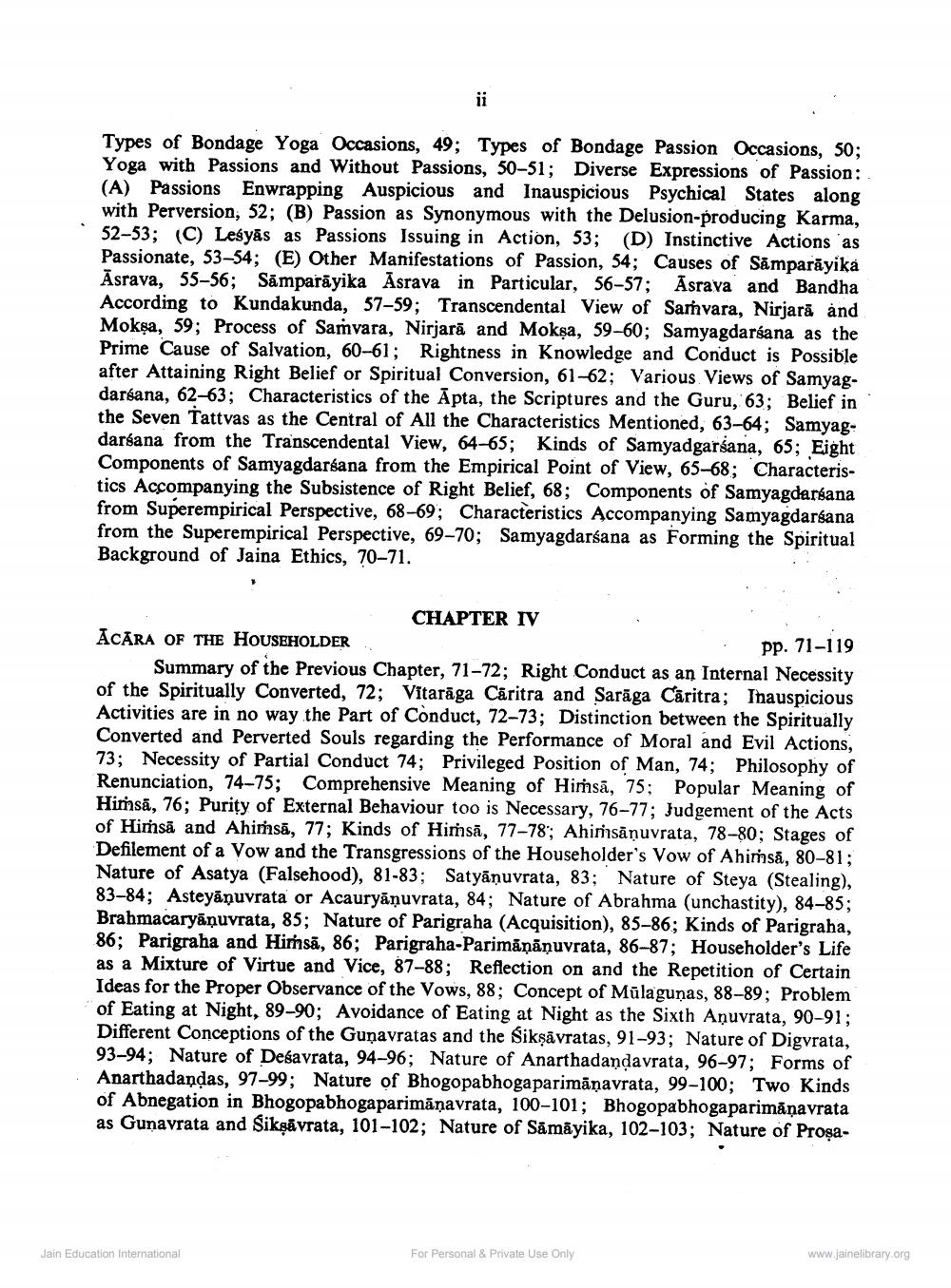Book Title: Ethical Doctrines in Jainism Author(s): Kamalchand Sogani Publisher: Jain Sanskruti Samrakshak Sangh Solapur View full book textPage 6
________________ Types of Bondage Yoga Occasions, 49; Types of Bondage Passion Occasions, 50; Yoga with Passions and Without Passions, 50-51; Diverse Expressions of Passion: (A) Passions Enwrapping Auspicious and Inauspicious Psychical States along with Perversion, 52; (B) Passion as Synonymous with the Delusion-producing Karma, 52-53; (C) Leśyās as Passions Issuing in Action, 53; (D) Instinctive Actions as Passionate, 53-54; (E) Other Manifestations of Passion, 54; Causes of Sāmparāyika Āsrava, 55-56; Sāmparāyika Asrava in Particular, 56-57; Asraya and Bandha According to Kundakunda, 57-59; Transcendental View of Sarhvara, Nirjarā and Mokşa, 59; Process of Samvara, Nirjarā and Moksa, 59-60; Samyagdarsana as the Prime Cause of Salvation, 60-61; Rightness in Knowledge and Conduct is possible after Attaining Right Belief or Spiritual Conversion, 61-62; Various Views of Samyagdarsana, 62-63; Characteristics of the Apta, the Scriptures and the Guru, 63; Belief in the Seven Tattvas as the Central of All the Characteristics Mentioned, 63-64; Samyagdarśana from the Transcendental View, 64-65; Kinds of Samyadgarśana, 65; Eight Components of Samyagdarśana from the Empirical Point of View, 65-68; Characteristics Accompanying the Subsistence of Right Belief, 68; Components of Samyagdarsana from Superempirical Perspective, 68-69; Characteristics Accompanying Samyagdarsana from the Superempirical Perspective, 69-70; Samyagdarśana as Forming the Spiritual Background of Jaina Ethics, 70-71. CHAPTER IV ĀCĀRA OF THE HOUSEHOLDER... pp. 71-119 Summary of the Previous Chapter, 71-72; Right Conduct as an Internal Necessity of the Spiritually Converted, 72; Vitarāga Caritra and Sarāga Caritra; Inauspicious Activities are in no way the part of Conduct, 72-73; Distinction between the Spiritually Converted and Perverted Souls regarding the Performance of Moral and Evil Actions, 73; Necessity of Partial Conduct 74; Privileged Position of Man, 74; Philosophy of Renunciation, 74-75; Comprehensive Meaning of Himsā, 75; Popular Meaning of Himsā, 76; Purity of External Behaviour too is Necessary, 76-77; Judgement of the Acts of Himsā and Ahimsā, 77; Kinds of Himsā, 77-78; Ahirsāņuvrata, 78-80; Stages of Defilement of a Vow and the Transgressions of the Householder's Vow of Abiṁsā, 80-81; Nature of Asatya (Falsehood), 81-83; Satyāņuvrata, 83; Nature of Steya (Stealing), 83-84; Asteyāņuvrata or Acauryāņuvrata, 84; Nature of Abrahma (unchastity), 84-85; Brahmacaryāņuvrata, 85; Nature of Parigraha (Acquisition), 85-86; Kinds of Parigraha, 86; Parigraha and Hirsā, 86; Parigraha-Parimāņāņuvrata, 86-87; Householder's Life as a Mixture of Virtue and Vice, 87-88; Reflection on and the Repetition of Certain Ideas for the Proper Observance of the Vows, 88; Concept of Mūlaguņas, 88–89; Problem of Eating at Night, 89-90; Avoidance of Eating at Night as the Sixth Aņuvrata, 90-91; Different Conceptions of the Guņavratas and the Sikşāvratas, 91-93; Nature of Digvrata, 93-94; Nature of Deśavrata, 94-96; Nature of Anarthadaņdavrata, 96-97; Forms of Anarthadaņdas, 97-99; Nature of Bhogopabhogaparimāņavrata, 99-100; Two kinds of Abnegation in Bhogopabhogaparimāņavrata, 100-101; Bhogopabhogaparimāņavrata as Gunavrata and Sikşāvrata, 101-102; Nature of Sāmāyika, 102-103; Nature of Prosa For Personal & Private Use Only www.jainelibrary.org Jain Education InternationalPage Navigation
1 ... 4 5 6 7 8 9 10 11 12 13 14 15 16 17 18 19 20 21 22 23 24 25 26 27 28 29 30 31 32 33 34 35 36 37 38 39 40 41 42 43 44 45 46 47 48 49 50 51 52 53 54 55 56 57 58 59 60 61 62 ... 322
